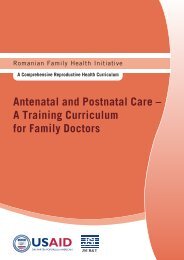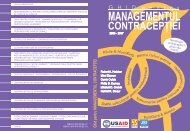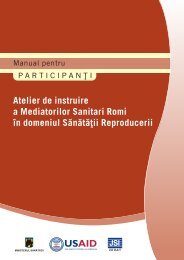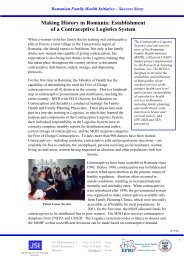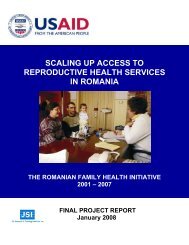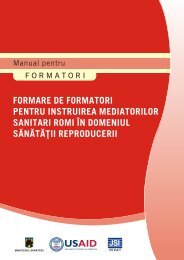Training of Roma Health Mediators in Reproductive Health
Training of Roma Health Mediators in Reproductive Health
Training of Roma Health Mediators in Reproductive Health
Create successful ePaper yourself
Turn your PDF publications into a flip-book with our unique Google optimized e-Paper software.
Refer the group to the flip chart Feedback (<strong>in</strong>troduced the first day <strong>of</strong> tra<strong>in</strong><strong>in</strong>g) and rem<strong>in</strong>d<br />
them <strong>of</strong> the importance <strong>of</strong> respect<strong>in</strong>g the rules for giv<strong>in</strong>g and receiv<strong>in</strong>g feedback.<br />
Series 1: Divide the group <strong>in</strong>to small groups <strong>of</strong> 3. In each group, for the first role play there<br />
is a mediator, a woman <strong>in</strong> the community and an observer. Give a prepared role play case to<br />
the woman who reads it (silently to herself) to prepare her role. Inform the entire group only<br />
that this role play concerns a woman who (is pregnant, has a new baby etc – whatever the<br />
reproductive health issue is for this particular role play).<br />
Note: The same role play situation should be given to all groups so that the large group<br />
discussion follow<strong>in</strong>g each role play can focus on common issues.<br />
Note: In order to make the classroom practice as real as possible, the mediator should only<br />
know <strong>in</strong> advance the reproductive health issue be<strong>in</strong>g addressed.<br />
Note: Dur<strong>in</strong>g the role plays, tra<strong>in</strong>ers should move around the room and observe the groups:<br />
• Tak<strong>in</strong>g note <strong>of</strong> particular skills <strong>of</strong> mediators, and problems they encounter, to be<br />
raised <strong>in</strong> the large group discussion follow<strong>in</strong>g the role plays<br />
• Ensur<strong>in</strong>g that all groups are actively engaged <strong>in</strong> the role plays<br />
<br />
<br />
<br />
<br />
<br />
<br />
<br />
Give the groups 10 m<strong>in</strong>utes to conduct their role plays.<br />
Stop the role plays and give the small groups 2 m<strong>in</strong>utes to share feedback with<strong>in</strong> their<br />
groups (beg<strong>in</strong>n<strong>in</strong>g with the mediator, followed by the woman and then the observer).<br />
Participants use the flip chart/participant document Role Play Discussion Questions as<br />
the basis for giv<strong>in</strong>g feedback.<br />
Discuss <strong>in</strong> the large group participants’ observations, what they learned from apply<strong>in</strong>g<br />
communication skills <strong>in</strong> the role play, and any observations they have about how best to<br />
conduct similar discussions <strong>in</strong> their communities (8 m<strong>in</strong>utes).<br />
Ask participants to change roles with<strong>in</strong> the groups and conduct a second role play, as<br />
<strong>in</strong>dicated <strong>in</strong> the <strong>in</strong>structions above. Give the (new) woman <strong>of</strong> each group a new role<br />
(the same role play situation to be used by all groups); and <strong>in</strong>form the large group only<br />
<strong>of</strong> the reproductive health issue be<strong>in</strong>g addressed <strong>in</strong> this role play.<br />
Give the groups 10 m<strong>in</strong>utes to conduct their role plays<br />
Stop the role plays and give the groups 2 m<strong>in</strong>utes to share feedback with<strong>in</strong> their groups<br />
(beg<strong>in</strong>n<strong>in</strong>g with the mediator, followed by the woman and then the observer).<br />
Participants use the flip chart/participant document Role Play Discussion Questions as<br />
the basis for giv<strong>in</strong>g feedback.<br />
Discuss <strong>in</strong> the large group participants’ observations, what they learned from apply<strong>in</strong>g<br />
communication skills <strong>in</strong> the role play, and any observations they have about how best to<br />
conduct similar discussions <strong>in</strong> their communities (8 m<strong>in</strong>utes).<br />
<br />
Ask participants to change roles with<strong>in</strong> the groups and conduct a third role play, as<br />
<strong>in</strong>dicated <strong>in</strong> the <strong>in</strong>structions above. Give the (new) woman <strong>of</strong> each group a new role<br />
(the same role play situation to be used by all groups); and <strong>in</strong>form the large group only<br />
<strong>of</strong> the reproductive health issue be<strong>in</strong>g addressed <strong>in</strong> this role play.<br />
221<br />
RFHI/JSI <strong>Roma</strong>nia <strong>Tra<strong>in</strong><strong>in</strong>g</strong> <strong>of</strong> RHMs <strong>in</strong> <strong>Reproductive</strong> <strong>Health</strong> Session 14: Interpersonal Communication



